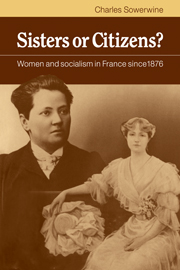Book contents
- Frontmatter
- Contents
- Preface
- Abbreviations of organisations
- Bibliographical abbreviations
- Introduction
- Part I Feminism and socialism 1876–1900
- Part II Origins of the socialist women's movement 1899–1914
- Part III Development and decline of the socialist women's movement 1914–79
- Conclusion
- Appendix 1 The Second International and the woman question 1889–1904
- Appendix 2 French socialist women in figures
- Appendix 3 Elisabeth Renaud and the Cambier affair
- Notes
- Bibliography
- Index
Appendix 1 - The Second International and the woman question 1889–1904
Published online by Cambridge University Press: 07 October 2011
- Frontmatter
- Contents
- Preface
- Abbreviations of organisations
- Bibliographical abbreviations
- Introduction
- Part I Feminism and socialism 1876–1900
- Part II Origins of the socialist women's movement 1899–1914
- Part III Development and decline of the socialist women's movement 1914–79
- Conclusion
- Appendix 1 The Second International and the woman question 1889–1904
- Appendix 2 French socialist women in figures
- Appendix 3 Elisabeth Renaud and the Cambier affair
- Notes
- Bibliography
- Index
Summary
The Second International was slow to organise itself and remained extremely loose even in its prime, in the decade before the First World War. Before 1900 it was more a convention than a high command. Its decisions carried a certain moral weight, especially with the POF, the party most committed to internationalism, but were at best no more than statements of the sense of international socialist opinion. Moreover, before unity in 1905, application of the International's resolutions in France was further hampered by the division of French socialism. The quarrels of the French even compromised the birth of the Second International. Two founding congresses were held simultaneously in Paris, July 1889: one Possibilist, organised by the FTSF, the other Marxist, organised by the POF. The Possibilists numbered two French women among their delegates: Astié de Valsayre and Mme Vincent. The Marxists had Aline Valette. Neither congress discussed women's rights as such, but both passed resolutions on labour legislation which included some aspects of the woman question. The Possibilists called for the abolition of night work for women and children, the Marxists for the prohibition of women from all sectors of industry ‘which affect more particularly the feminine organism’. Both called for equal pay for equal work. The Marxists declared ‘furthermore that it is the duty of workers to admit women into their ranks, on an equal footing’.
- Type
- Chapter
- Information
- Sisters or Citizens?Women and Socialism in France since 1876, pp. 195 - 197Publisher: Cambridge University PressPrint publication year: 1982



